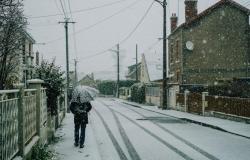The editor denounces the campaigns orchestrated by certain media in Algeria regarding Hourisa novel which retraces the dark years which left at least 200,000 dead.
The publisher Antoine Gallimard denounced on Monday the “defamatory” attacks against the Franco-Algerian author Kamel Daoud, Goncourt 2024 for his novel “Houris”, accused by a victim of the civil war in Algeria of having exploited its history and its traumas.
« And Houris is inspired by tragic events that occurred in Algeria during the civil war of the 1990s, its plot, its characters and its heroine are purely fictional.says Antoine Gallimard in a press release.
« Since the publication of his novel, Kamel Daoud has been the subject of violent defamatory campaigns orchestrated by certain media close to a regime whose nature is well known. »continues the director of the publishing house who was banned from presenting his works at the Algiers international book fair, which ended on Saturday.
The ban on participating in this show was notified to Editions Gallimard at the beginning of October, when HourisMr. Daoud's novel about the violence of the “black decade” (between 1992 and 2002), was already seen as one of Goncourt's great favorites.
He won the prize, the most important in French literature, on November 4. The book could not be published in Algeria, where it falls under a law prohibiting any work on this bloody period which left at least 200,000 dead, according to official figures.
“After the ban on the book and our publishing house at the Algiers book fair, it is the turn of his wife (professional psychiatrist, Editor’s note), who did not in any way source the writing of Houris, to be affected in his professional integrity”continues Gallimard.
According to Algerian media, Saâda Arbane, survivor of a massacre during the Black Decade, who was medically followed by Kamel Daoud's wife, says she recognized herself in the main character of Houris.
“Houris”, which in the Muslim faith designates young girls promised to paradise, is a dark novel taking place partly in Oran on the fate of Aube, a young woman who has been mute since an Islamist slit her throat on December 31 1999.
France
Books






